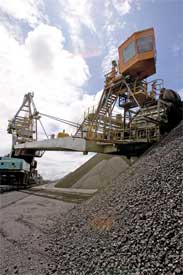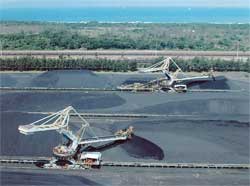
Related



Fighting for the royalty treatment: IP disputes in SA's music scene
Fathima Ismail and Sara-Jane Pluke 11 Nov 2025



Top stories






More news
















For several years Eskom has been warning of looming shortages of coal supplies for its power stations. The government has made it clear it intends to declare coal a "strategic mineral"‚ which would enable it to exert some control over sales.
However‚ ENS Africa associate André Vermeulen and director Andries Myburgh say the proposed amendments do not appear to be strategically designed to restrict coal exports.
Rather‚ they reflect the Treasury's dissatisfaction with the gap between revenue earned by coal companies and the amount paid in royalty tax‚ which is greater than for any other mineral.
Allan Reid‚ a director at DLA Cliffe Dekker Hofmeyr‚ says the proposed amendments do not target coal companies specifically‚ but they are most problematic for the coal sector.
They also appear to have the unintended consequence of prejudicing smaller coal companies that do not have the facilities to wash the coal themselves but sell it to bigger companies for beneficiation.

Under the current royalty act‚ coal companies pay a royalty based on a percentage of gross sales at a deemed price at the first point of sale‚ which currently assumes a calorific value (CV) of 19 megajoules/kilogram (MJ/kg)‚ unless the coal is extracted at a higher CV. In that case‚ the price is based on the extraction CV.
The minimum CV of 19 is the CV needed for Eskom's older power stations‚ but not its two newest‚ Kusile and Medupi‚ which require a CV of betwee 22 and 23.
That means the deemed price used by coal companies to determine their royalty liability is the Eskom price.
But there is a huge gap between the price at which low-CV coal is sold to Eskom‚ which is about R120 a ton and the export price‚ which is about R800 a ton. To upgrade coal to export quality‚ miners have to wash and process it‚ which increases the CV.
The current royalty act does not penalise coal companies for beneficiating the coal. But under the proposed amendments‚ coal with a CV value of up to 19 will attract a royalty based on a deemed price‚ but coal with a CV value of between 19MJ/kg and 27MJ/kg will attract a royalty calculated on the actual price received by the mining company. This is not the case for any other mineral.

"The proposed amendments will essentially not only levy a mineral royalty on the value of the coal extracted‚ but also on the value added to the coal through beneficiation and by doing so‚ effectively 'penalise' the extractor for beneficiating its coal‚" Vermeulen says.
Reid does not agree the amendments intend to penalise companies for beneficiation‚ but he believes they continue to cause confusion in the determination of gross sales through the concepts of "he condition specified at extraction‚ or the range in which the mineral resource is extracted and "he condition specified at the transfer point.
Vermeulen says concerns were raised with the Treasury and the South African Revenue Service.
Commentators pointed out that one of the key principles agreed before the royalty act was implemented was that the royalty should be calculated on the mineral's first saleable point‚ as close to the mouth of the mine as possible. This would ensure the state was compensated for the minerals in the ground‚ but miners were not penalised for beneficiating them.
Myburgh says the difference the amendments will make to royalty payments for exporting coal companies will be quite significant. Whether the increased tax will create a disincentive to export coal‚ though‚ is doubtful.
Exporting coal is likely to remain a higher-margin business than selling to Eskom‚ though there are other advantages to an Eskom contract.
Vermeulen says an overhaul of mining royalties should also make a distinction between thermal and coking coal and anthracite and the different markets for these products.
Alternatively‚ coal beneficiated above a certain quality should be classified as a Schedule One‚ or refined mineral‚ on which the royalty rate is lower than it is for a Schedule Two‚ or unrefined mineral.
The amendments are likely to come into effect in March next year.

For more than two decades, I-Net Bridge has been one of South Africa’s preferred electronic providers of innovative solutions, data of the highest calibre, reliable platforms and excellent supporting systems. Our products include workstations, web applications and data feeds packaged with in-depth news and powerful analytical tools empowering clients to make meaningful decisions.
We pride ourselves on our wide variety of in-house skills, encompassing multiple platforms and applications. These skills enable us to not only function as a first class facility, but also design, implement and support all our client needs at a level that confirms I-Net Bridge a leader in its field.
Go to: http://www.inet.co.za